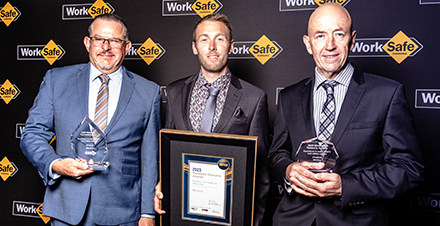
MechLog’s Work Health & Safety Manager Duncan Norton, Regional Manager Northwest Tasmania Dave Rowbottom and Managing Director Anthony Brown.
The 2023 WorkSafe Tasmania Awards have recognised organisations that excel in creating a culture where safety is paramount, and one standout winner has emerged – Mechanised Logging (MechLog). The company took home the award for Excellence in work health and safety culture. Source: Timberbiz
The Tasmanian-based national forest industries company has been providing specialised timber harvesting services to the plantation timber industry in Australia since 1994. This prestigious award acknowledges MechLog’s unwavering commitment to safety, sustainability, and employee well-being.
MechLog has dedicated almost three decades to transforming the perception of the forestry industry from one associated with destruction and unsafe practices to a modern, sustainable sector where productivity and safety are top priorities.
MechLog’s Managing Director, Anthony Brown, emphasised the significance of building a workplace culture where safety governs every task.
“MechLog’s work health and safety culture is deeply rooted in its ethos, where every member of the team matters, and a ‘safety-first’ approach governs every task. This culture has been cultivated through systematic safety management, education, training, and peer support since we started MechLog in 1994,” Mr Brown said.
“MechLog’s comprehensive safety management system is integrated into the core of the business, reflecting the importance we place on safety. Safety is not an add-on; it’s an intrinsic part of our operations, managed and updated regularly by a dedicated Safety Manager. Safety is a standing agenda item in management meetings, ensuring it receives the attention it deserves.
“MechLog’s safety culture is not solely the responsibility of the management; it requires buy-in from every level of the organisation. This culture leads to improved employee morale, productivity, and job satisfaction. In a workplace where employees feel safe and supported, they are more engaged, motivated, and committed to their work. This leads to increased productivity, higher quality work, and improved customer satisfaction,” he said.
The organisation’s commitment to safety is evident in its minimal workers’ compensation claims history and supported by its insurance provider.
From clear safety responsibilities to positive communication, employee engagement, and recognition of personnel for their performance, safety is at the forefront of every aspect of MechLog’s operations.
Education plays a pivotal role in MechLog’s journey toward creating a positive work health and safety culture. The company actively encourages employees to pursue further education and training to enhance their skills, supporting career development and additional life skills. This holistic approach supports personnel’s personal development and job satisfaction.
MechLog doesn’t stop at safety; it also actively promotes education and discussions around critical topics such as mental health, well-being, fitness, nutrition, diversity, inclusion, and reconciliation. Anthony highlighted the company’s innovative program, Skills Enhancement and Employee Development (SEED), which is designed to build a well-rounded employee and team.
“SEED is designed to nurture talent and equip young participants with both technical skills and life skills. Participants in this programme gain a Certificate III in Forest Operations qualification and receive personal development opportunities through extracurricular programs. SEED embodies MechLog’s commitment to providing meaningful employment and career paths, focusing on safety, personal development, and enhancing skills and knowledge,” Mr Brown said.
MechLog’s positive work health and safety culture has not only created a safer and more supportive workplace but also led to remarkable opportunities. The company’s culture has contributed to its success in winning new contracts and expanding the business. MechLog’s proprietary safety management systems have played a crucial role in these achievements, reassuring stakeholders of their commitment to safety and well-being.
Mr Brown says that a strong safety culture is essential for several reasons.
“When employees feel safe and supported, they are more likely to be engaged and motivated. A positive safety culture enhances morale and job satisfaction, resulting in higher productivity and quality of work. Also, an effective work health and safety culture not only prevents accidents and injuries but also reduces the direct and indirect costs associated with workplace incidents. This includes medical expenses, compensation claims, lost productivity, and reputational damage,” he said.
“Then you must look at business performance. A strong safety culture leads to improved business performance. Engaged and committed employees are more likely to provide high-quality work and exceptional customer satisfaction. This, in turn, can lead to business growth and success. Also, organisations that prioritise safety are more attractive to potential employees. Talented individuals prefer to work for companies that prioritise their health and well-being. This is especially important in a competitive job market.
“A positive safety culture ensures compliance with safety regulations and standards, helping the organisation to avoid legal issues and fines, as well as building a positive relationship with regulatory authorities; and, of course, safety and sustainability often go hand in hand. A safe workplace is more likely to follow sustainable practices, contributing to the long-term viability of the organisation and the industry.”
MechLog’s success story demonstrates the tangible benefits of a strong WHS culture. Their commitment to safety has not only created a safer and more supportive workplace but has also led to impressive business expansion opportunities. This positive safety culture serves as a model for other organisations looking to achieve similar success.
While MechLog has achieved remarkable success in building a positive work health and safety culture, it is essential to acknowledge that maintaining and continuously improving such a culture is an ongoing challenge. The ever-changing nature of industries and workplaces demands constant adaptation and innovation.





